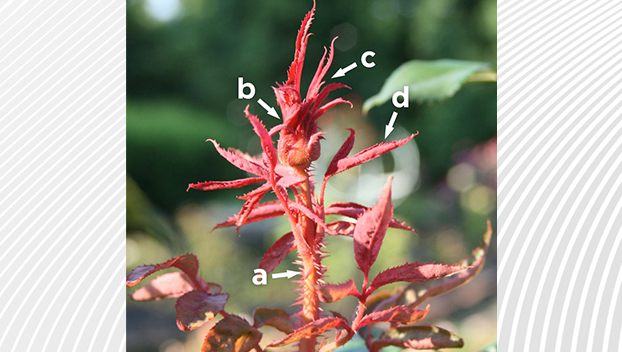Telltale signs of rose rosette virus
Published 3:45 pm Wednesday, February 10, 2021

- VISIBLE SYMPTOMS: This photo of a rose plant infected with the rose rosette virus shows several common symptoms. They are labeled as follows: a. excessive thorniness, b. distorted flower buds, c. red tissue and d. strapped leaves. (Photo submitted by Gene Fox)
|
Getting your Trinity Audio player ready...
|
Every once in a great while, I get to take my wife out to eat on an actual date. No kids, no work, just the two of us on a nice romantic evening. That is, until I see a plant disease while we’re waiting on our table at the restaurant! She tells me we can’t go anywhere without me looking at plants! Of course, I can’t help but to see them, I pay attention to detail as long as it isn’t my socks on the floor!
This leads me to asking do you pay attention to your plants? We have grass, trees, vegetables, bushes, houseplants, and so on around our homes, how often do you stop to take a look at them? I’m guilty, I try to walk around at least once a week just because I like to see them. But, if I’m being honest, I don’t look at my garden every day. It’s really a shame too because this little time-out can be the easiest way to detect problems with our plants.
I was in training today (Wednesday), that gave me the idea to write this article on a devastating disease called Rose Rosette Virus. As the name implies, it affects roses and causes them to form rosettes. Symptoms of this disease are excessive thorniness, distorted flower buds, thickened stems, thin leaves, and oftentimes red stems and leaves.
Why is this a problem? Much like the novel coronavirus, there is no cure and it is highly contagious. Once the rose is infected, there is nothing you can do to reverse the problem. The virus is spread by tiny microscopic mites called Eriophyid mites. These mites are so tiny that they actually use the wind to disperse. Only feeding on roses, if they do not fall upon a host, they continue to balloon and fly until they find one. At this point, they get down into the base of the leaves where it is hard to reach them with pesticides.
Once a rose is infected it may be asymptomatic for some time. The symptoms mentioned above can be indicators of other problems so it can be difficult to diagnose. For example, new growth of roses tends to be red in color and have thin leaves. Exposure to glyphosate (the active ingredient in products such as Round-up) can cause the witches broom effect or thin leaves.
In the training, it was discussed that certain varieties show what can be perceived as resistance but they must be studied further to reach that conclusion.
So what do we do? Pesticides are not really effective and there aren’t any resistant varieties. We scout! Take a look at the plants on a regular basis looking for these symptoms. Remove infected plants as soon as possible. If you are unable to remove the entire plant for some reason, remove the symptomatic parts until you can. These areas hold up to 40% more eriophyid mites than the rest of the plant. Once the plant is removed, another can be put into its place within one week. However, pay attention to other plants in the area for symptoms, very rarely will you escape with replacing just one plant. Roses coming from the nursery can be asymptomatic as well so be sure to scout new landscape plantings.
Often, roses are planted in monoculture stands, making the devastation much worse. An entire planting can be killed in no time. If roses are intermingled in plantings, the spread could be much less severe. Research has shown that wind barriers can have some effectiveness in lessening the chance of infection. Remember, these things are flying in the wind and are literally the size of a speck of dust.
Have you ever read Dr. Seuss’ “Horton Hears a Who”? Put your ear to the ground and do some scouting, this could make the difference between replacing an entire planting and just a few plants.
Are you a landscape professional? It is well worth your time to become aware of this and other disease issues in the landscape. NC State University has multiple resources to help with this, come see your local horticulture agent! If you have a question about livestock, food, crops, or plants look no further than your local Extension Center! Do you need help growing in your home landscape, call the Extension office at (252)946-0111 or email Gene at gene_fox@ncsu.edu.
Gene Fox is the area consumer horticulture agent with North Carolina Cooperative Extension.





